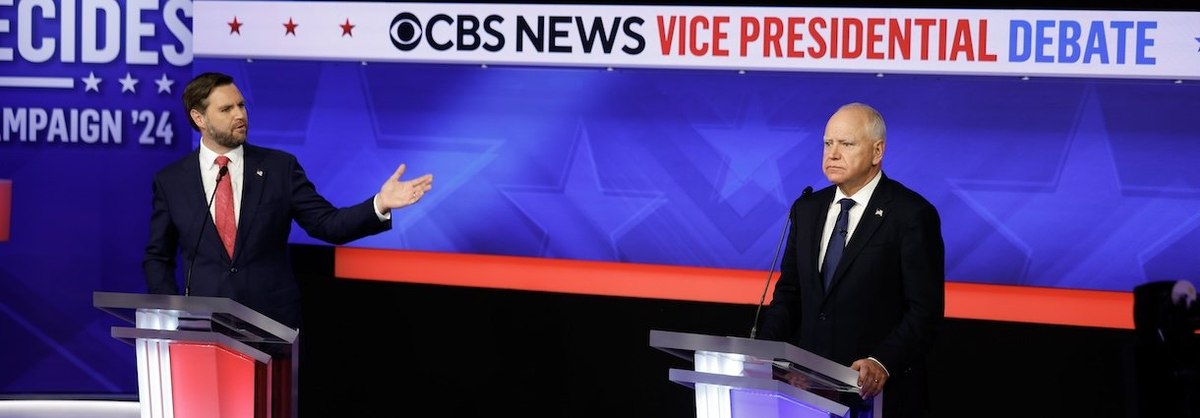This week’s Economist/YouGov poll covers the election, the possibility of a woman winning the presidency, the candidates, campaign media coverage, Congress, the filibuster, and Eric Adams.
Election 2024
State of the race
- Vice President Kamala Harris still holds a narrow edge over former President Donald Trump among registered voters: 48% to 45%
- Harris' lead is the same among likely voters — registered voters who either say they will definitely vote or say they will probably vote and voted in 2020 or 2022
- All respondents completed the survey before Tuesday's vice presidential debate, and after Hurricane Helene made landfall in the U.S.
- Democrats are more enthusiastic than Republicans about voting for president this year: 68% of Democrats say they are extremely or very enthusiastic about voting, compared with 59% of Republicans
- Among registered voters:
- Harris leads among women by 10 percentage points while Trump leads among men by 4 points
- Harris leads by 15 points with people whose annual family incomes exceed $100,000, while those with lower family incomes are closely divided
- Independents are also closely divided: 42% say they will vote for Harris while 40% prefer Trump
- Trump leads Harris by 11 points among white Americans, with especially strong support among those with family income that is less than $100,000
- Trump leads by 40% to 32% with the smaller group of Independents who do not lean towards either party; others are undecided or not voting at all
Views on the vice presidential debate
- This week's Economist / YouGov Poll concluded before Tuesday night's vice presidential debate between Tim Walz and JD Vance, but a separate YouGov survey conducted immediately after the debate found that 55% of registered voters say they watched most or all (35%) or parts (20%) of the debate
- The often-collegial debate may have contributed to improved views of both candidates — and especially Vance
- A survey immediately before the debate found that 37% of registered voters (and 9% of Democratic registered voters) had a very or somewhat favorable view of Vance; the survey immediately after the debate found that 42% of registered voters and 18% of Democrats had a favorable view of Vance
- The share of registered voters with very or somewhat unfavorable views of Vance fell from 48% to 41%
- A survey immediately before the debate found that 37% of registered voters (and 9% of Democratic registered voters) had a very or somewhat favorable view of Vance; the survey immediately after the debate found that 42% of registered voters and 18% of Democrats had a favorable view of Vance
A woman in the White House?
- 57% of Americans say they believe the country is ready to elect a woman president, the same percentage who said that in 2019 – though fewer than said so in 2015
- There are only slight gender differences: Majorities of men and women say they think the U.S. is ready to elect a woman as president
- This year, with a woman at the top of the Democratic ticket, there is a party gap: Democrats are twice as likely as Republicans to believe the country is ready to elect a woman as president
- 53% of Americans personally hope that the country elects a woman to be president in their lifetime
- 57% of women and 48% of men hope this happens
- 87% of Democrats and 21% of Republicans hope so
Views of Harris and Trump
- 40% of registered voters now say the 78-year-old Donald Trump’s health and age would severely limit his ability to do the job of president, compared to 30% who said so in early June — a week before Trump's 78th birthday and a month before Joe Biden withdrew from the race
- 76% of Harris supporters say Trump’s health and age would severely limit his ability to be president, but only 3% of Trump supporters — 66% of whom say his health and age would have no impact on his ability to do the job
- Among registered voters:
- Majorities agree that each nominee is very or somewhat intelligent: 65% say this about Harris while 56% do about Trump
- 55% say Trump is a very or somewhat strong leader, while 51% say the same about Harris
- 46% say they like Harris Trump a lot or somewhat, while 34% say the same about Trump
- Whatever they think, nearly all registered voters who say they will vote for Harris or Trump see no likelihood they could change their minds before the election (97% of Harris supporters and 95% of Trump supporters)
- Majorities of both Harris supporters (65%) and Trump supporters (74%) say they mostly are voting for their preferred candidate, rather than against the opposing candidate
- Before Joe Biden withdrew, only 38% of Biden supporters said they were mostly voting for Biden while 61% were mostly voting against Trump
Media coverage of the candidates
- 44% of registered voters say the news media coverage of this year’s presidential election is worse than usual; only 15% say it's better than usual
- Harris supporters are closely divided on whether the news media is better or worse this year; 62% of Trump supporters say it's worse than usual and only 9% say it's better
- Trump supporters are also critical of media coverage of the candidates: 85% say the media has been harder on Trump than on other candidates, compared to just 2% who say the same about Harris, while 83% say the media has been easier on Harris
- 68% of Trump supporters say the media has been easier on Tim Walz than on other candidates; only 3% say the same about JD Vance and 68% say the media have been harder on him
- Fewer Harris supporters say the the media have missed the mark in coverage of candidates: 32% say the media have been harder on Harris than on other candidates, 9% say the same about Trump, and 41% say the media has been easier on Trump
Congress and the filibuster
- Democrats have a 3-point edge over Republicans in registered voters' voting intent for the House of Representatives
- Many Americans aren’t sure what they think about the filibuster — a legislative tactic that can hold up legislation — and those with an opinion are divided: 28% say filibusters are mostly good, 29% mostly bad
- Democrats and Republicans take opposing views; Democrats are more likely to consider the filibuster as mostly bad, while Republicans are more likely to say it is mostly good
Eric Adams
- Nearly two-thirds of Americans have heard at least a little about the indictment last week of New York City Mayor Eric Adams for bribery and campaign finance violations
- 41% of Americans have very or somewhat unfavorable opinions of Adams; 13% view him favorably
- Adams is far more likely to be viewed unfavorably than favorably among Democrats, Republicans, and Independents
Throughout this report, some numbers may appear to be off by 1 because of rounding
— Carl Bialik contributed to this article
See the toplines and crosstabs for the September 29 - October 1, 2024 Economist/YouGov Poll
Methodology: The poll was conducted among 1,638 U.S. adult citizens. Respondents were selected from YouGov’s opt-in panel to be representative of U.S. adult citizens. A random sample (stratified by gender, age, race, education, geographic region, and voter registration) was selected from the 2019 American Community Survey. The sample was weighted according to gender, age, race, education, 2020 election turnout and presidential vote, baseline party identification, and current voter registration status. Demographic weighting targets come from the 2019 American Community Survey. Baseline party identification is the respondent’s most recent answer given prior to November 1, 2022, and is weighted to the estimated distribution at that time (33% Democratic, 31% Republican). The margin of error for the overall sample is approximately 3%
Image: Getty (Chip Somodevilla / Staff)
What do you think about the election, American politics in general, and everything else? Have your say, join the YouGov panel, and get paid to share your thoughts. Sign up here.
















